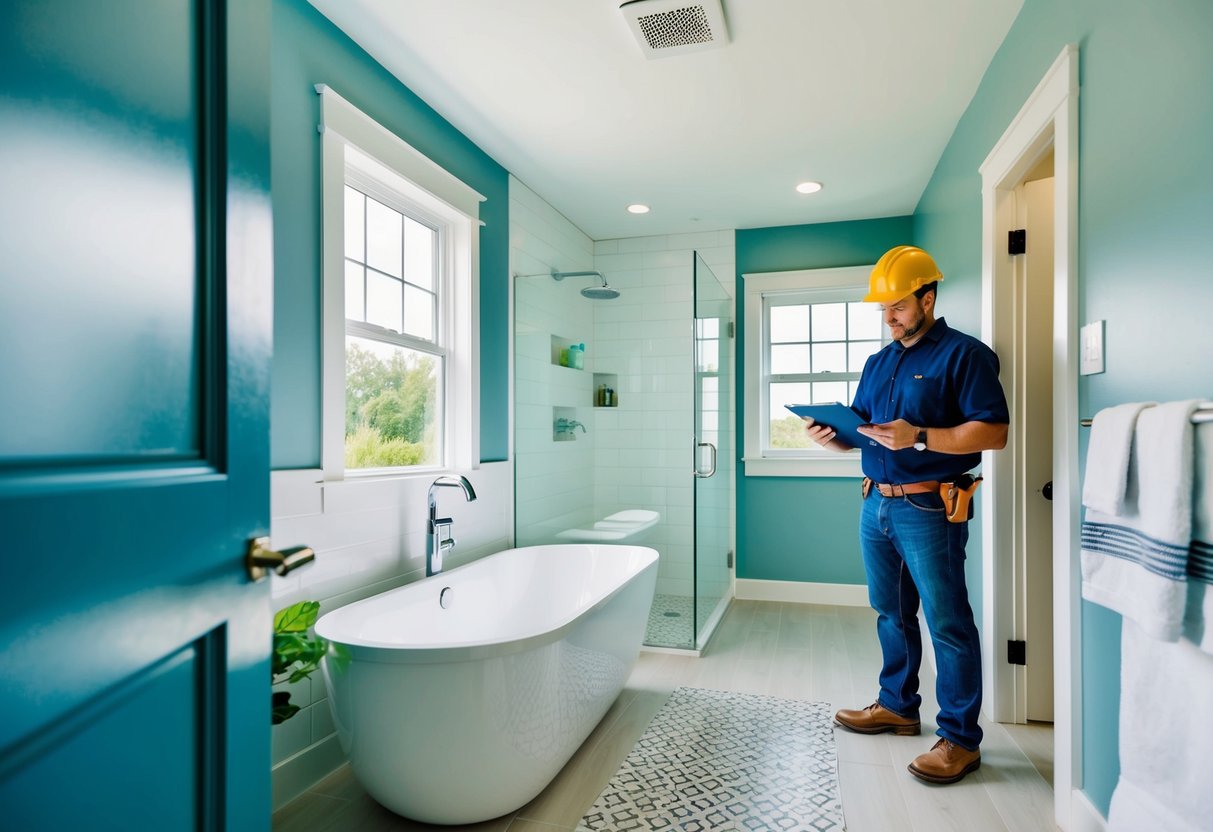Renting out a property on Airbnb can be a great way to make extra cash.
Many people wonder if they can Airbnb a rental property they don’t own. You can Airbnb a rental property, but you need to check your lease agreement and local laws first.

Before listing a rental on Airbnb, talk to your landlord. Some leases don’t allow subletting or short-term rentals.
Even if your lease is okay with it, you still need to look into local rules. Different councils in Australia have their own laws about short-term rentals.
There are pros and cons to Airbnb-ing a rental.
You can earn more money than with a long-term tenant. But it’s also more work. You’ll need to clean between guests and deal with bookings. Think about if you have the time and energy for this before you start.
Key Takeaways
- Check your lease and local laws before listing a rental on Airbnb
- Talk to your landlord and get their okay first
- Weigh up the extra income against the added work of short-term rentals
Understanding the Basics of Airbnb

Airbnb lets you rent out your space to guests for short stays. It’s a way to make extra cash from your property.
What Is Airbnb?
Airbnb is an online platform that connects hosts with guests looking for places to stay.
As a host, you can list your rental property on Airbnb for short-term bookings.
Guests can rent rooms, flats, or entire houses. They often choose Airbnb over hotels for a more home-like feel and better value.
Airbnb handles bookings and payments. It also offers services to help hosts manage their listings and guests.
How Does Airbnb Work for Hosts?
To start hosting on Airbnb, you create a listing for your rental property. You add photos, details, and set your prices and rules.
When guests book your place, Airbnb takes a small fee from both you and the guest. You’ll get paid after the guest checks in.
You can choose to be hands-on or hands-off with guests. Some hosts greet guests in person, while others use lockboxes for self-check-in.
Airbnb provides tools to help you manage bookings, talk to guests, and keep your calendar up to date. You can also set your own house rules and cleaning standards.
Legal Considerations for Renting Out Property

Renting out property on Airbnb involves several legal aspects. You need to be aware of local rules, your lease terms, and required permits.
Local Laws and Regulations
Different cities in Australia have varied Airbnb rules. In Melbourne and Sydney, the approach is more relaxed. But other areas might have stricter laws. Check your local council’s website for specific rules.
Some places only allow short-term rentals in primary homes. Others set limits on how long you can rent out your space. You might face fines if you break these rules.
It’s your job to know and follow local laws. Don’t assume what’s okay in one city applies everywhere.
Lease Agreements and Subleasing
If you’re a tenant, your lease likely bans subletting without the landlord’s okay. This includes Airbnb rentals. Check your lease carefully.
You must get written permission from your landlord before listing on Airbnb. If you don’t, you could be evicted.
Some landlords might agree if you share profits or pay extra rent. Others may say no outright. Be ready for either answer.
Remember, even with landlord approval, you’re still bound by local laws.
Licences and Permits Required
You might need special licences or permits to run an Airbnb. These vary by location and property type.
Some councils require a business licence for short-term rentals. Others ask for safety inspections or fire certificates.
In some areas, you need to register as a host with the local government. This often comes with a fee.
Check if you need an ABN (Australian Business Number). You usually don’t if it’s your own home, but might for an investment property.
Don’t forget about insurance. Your regular home insurance might not cover Airbnb guests. Look into specialist short-term rental insurance.
Financial Implications of Airbnb Rentals

Renting your property on Airbnb can impact your finances in several ways. It’s important to understand the potential income, fees, and tax obligations.
Income Generation from Airbnb
Airbnb can be a great way to earn extra money from your rental property. Your income depends on factors like location, property type, and seasonal demand.
You can set your own nightly rates. Many hosts charge more on weekends and during peak seasons. Some cities have limits on how many nights you can rent out your place each year.
Keep in mind that your income isn’t just the nightly rate. You can also charge cleaning fees and extra guest fees. These can add up quickly.
Understanding Airbnb Fees
Airbnb takes a cut of your earnings. They charge hosts a service fee of about 3% for most bookings. This fee covers the cost of processing payments.
You might also need to pay for things like:
- Cleaning services
- Extra amenities for guests
- Property management (if you use a service)
- Higher utility bills
These costs can eat into your profits. It’s smart to budget for them when setting your rates.
Taxes Related to Short-Term Rentals
Taxes are a big part of Airbnb hosting. You need to report your Airbnb income on your tax return. This includes all money earned, not just your profit.
In Australia, you don’t need to pay GST on residential rentals. But you might need to pay income tax on your earnings. The amount depends on your total income for the year.
You can claim tax deductions for expenses related to your Airbnb rental. This includes things like:
- Mortgage interest
- Council rates
- Internet and utilities
- Cleaning and maintenance
Keep good records of all income and expenses. This makes tax time much easier.
Preparing Your Rental Property for Airbnb Guests

Getting your rental property ready for Airbnb guests takes some careful planning. You’ll need to stock up on key items and put safety measures in place to create a great experience.
Essential Amenities and Supplies
Make sure your space has all the basics guests expect. Provide comfy bedding, fresh towels, and toiletries like soap and shampoo. Stock the kitchen with cookware, dishes, and coffee-making gear.
Put out clean linens and extra blankets. Add a hairdryer, iron, and hangers in the bedroom. Don’t forget bin liners and cleaning supplies.
Set up fast Wi-Fi and list the login details. Add a smart TV with popular streaming services. Small touches like local guidebooks or snacks can make guests feel welcome.
Maintaining Safety and Security
Safety should be your top priority when hosting. Install smoke alarms and carbon monoxide detectors on each level. Put a fire extinguisher in an easy-to-spot place near the kitchen.
Create an emergency plan with important phone numbers and exit routes. Use strong locks on all doors and windows. Consider a smart lock system for easy check-ins.
Add motion-sensor lights outside. Keep walkways clear and well-lit. Make sure all appliances are in good working order. Have a first aid kit on hand just in case.
Building a Successful Hosting Experience

Creating a great hosting experience takes effort and attention to detail. It involves setting up an inviting space, managing guest expectations, and handling day-to-day operations smoothly.
Creating a Welcoming Space
Make your rental property feel like a home away from home. Start with comfy furniture and quality bedding. Add personal touches like local artwork or books about the area. Keep the space spotless – guests notice cleanliness right away.
Stock essentials like towels, toiletries, and kitchen basics. Provide clear instructions for using appliances and Wi-Fi. Consider extras that will delight travellers, such as a welcome basket or local treats.
Good lighting is key. Make sure all areas are well-lit, with options for soft mood lighting too. Fresh flowers or plants can brighten up the space and make it feel more lived-in.
Managing Guest Expectations and Experience
Clear communication is crucial. Be upfront about your property’s features and any quirks. Respond quickly to enquiries and bookings. Send a friendly welcome message before check-in with key info.
Set house rules that are fair and easy to follow. Explain them clearly in your listing and in a guidebook at the property. Be available to answer questions during the stay, but respect guests’ privacy.
After check-out, ask for feedback. Use reviews to improve your hosting. Address any issues promptly and professionally. Happy guests often become repeat bookers and leave glowing ratings.
Handling Logistics and Operations
Develop a smooth check-in process. Consider using a lockbox or smart lock for easy access. Create a detailed property manual covering everything from parking to rubbish disposal.
Set up a cleaning schedule that ensures the property is spotless between guests. Stock up on cleaning supplies and extra linens. Have a handyperson on call for any urgent repairs.
Use a booking calendar to keep track of stays and block off maintenance days. Consider using property management software to streamline operations. Keep records of income and expenses for tax purposes.
Build relationships with local service providers. Having reliable cleaners, maintenance workers, and even a go-to cafe or tour guide can enhance the guest experience and make your job easier.
Challenges and Solutions in Airbnb Hosting

Hosting on Airbnb can be rewarding, but it comes with its share of hurdles. Let’s look at some common issues and how to tackle them.
Dealing with Difficult Tenants or Guests
Tricky guests can be a headache for Airbnb hosts. To avoid problems, set clear house rules and communicate them upfront. Make sure guests know about noise limits, smoking bans, and pet policies.
Screen guests carefully by checking reviews and asking questions before booking. Trust your gut if something seems off.
If issues crop up during a stay, try to solve them quickly and calmly. Keep records of all chats with guests in case you need to involve Airbnb support.
For serious problems like property damage, take photos and report it to Airbnb right away. A security deposit can help cover small damages.
Navigating Neighbour and Community Relations
Good relationships with neighbours are key for smooth Airbnb hosting. Let your neighbours know you’re hosting and give them your contact info for any concerns.
Set quiet hours and tell guests about them. This helps keep the peace in your area.
Think about putting up a noise monitor to catch any loud parties early. But make sure guests know about it to respect their privacy.
Join local community groups to stay in the loop about short-term rental rules. Being proactive can help you avoid conflicts down the track.
Protecting Your Investment Property
Your rental property is a big asset, so it’s vital to protect it. Get solid insurance that covers short-term rentals. Regular home insurance often won’t cut it.
Do regular check-ups on your property to catch any wear and tear early. This helps avoid bigger, costlier repairs later.
Consider hiring a property manager if you can’t keep a close eye on things yourself. They can handle guest issues, cleaning, and maintenance.
Install security cameras outside the property, but never inside. Let guests know about any cameras for transparency.
Keep some money aside for unexpected costs like emergency repairs or periods without bookings. This helps you weather any rough patches.
The Future of Airbnb and Rental Properties

Short-term rentals like Airbnb are changing fast. New rules and shifting trends will shape how people use these platforms in the coming years.
Evolving Trends in Short-Term Rentals
Airbnb is likely to keep growing, but in new ways. More hosts may offer unique stays like treehouses or tiny homes to stand out.
Cities could see a rise in purpose-built short-term rental buildings.
Tech will play a bigger role too. Smart locks and self-check-in systems might become standard. This could make hosting easier for property owners.
Guests may want longer stays, blending work and travel. This “workcation” trend could lead to new types of listings catering to remote workers.
Regulatory Changes and Their Impact
Expect more rules around short-term rentals in Australia. Cities like Sydney and Melbourne might set stricter limits on how many nights you can rent out your place.
Some areas could require special licences for Airbnb hosts. Others might ban short-term rentals in certain neighbourhoods to protect housing for locals.
These changes could push some property owners back to long-term rentals. But they might also create new opportunities for those who adapt quickly to the new rules.
Zoning laws may shift to allow for more flexible housing use. This could open up new areas for short-term rentals, while closing off others.
Frequently Asked Questions

Renting out properties on Airbnb in Australia involves different rules across states and cities. Let’s look at some key regulations and requirements for hosts in various locations.
Is subletting a rented property on Airbnb permitted in New South Wales?
In New South Wales, subletting a rented property on Airbnb usually needs your landlord’s approval. Check your lease agreement first.
Some leases might forbid subletting outright. If it’s not mentioned, you’ll need to ask your landlord for written permission.
What are the regulations for listing an owner-occupied property on Airbnb in Victoria?
Victoria allows owner-occupied properties on Airbnb with fewer restrictions. You can rent out spare rooms or your whole home when you’re away.
There’s no cap on the number of nights you can host. But you must follow local council rules and pay any required fees.
Can a rental property be listed on Airbnb in Queensland?
In Queensland, listing a rental property on Airbnb depends on your lease and local council rules. Some areas have strict regulations.
You’ll need your landlord’s written permission. Check with your local council for any short-term rental restrictions or required permits.
Are there specific requirements for renting out a property on Airbnb in Sydney?
Sydney has a 180-day annual cap for whole-property short-term rentals if the host doesn’t live there. This applies to Greater Sydney, including popular areas like Bondi.
You’ll need to register your property and get a unique ID number. Safety measures like smoke alarms are also required.
What steps are involved in renting out a property on Airbnb in Melbourne without being the owner?
To rent out a property you don’t own in Melbourne, start by getting written permission from the landlord. Review your lease for any subletting clauses.
Next, check local council regulations. Some areas may require permits or have restrictions on short-term rentals.
How does one navigate Airbnb rental agreements in Australia?
When setting up Airbnb rental agreements in Australia, clearly state your house rules and expectations.
Include details about check-in, check-out, and any specific property guidelines.
Make sure your agreement complies with local laws and Airbnb’s policies.
It’s wise to have a lawyer review your rental agreement to ensure it’s legally sound.








